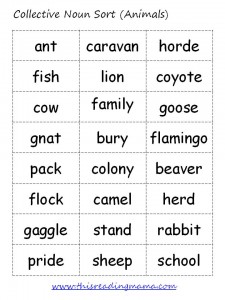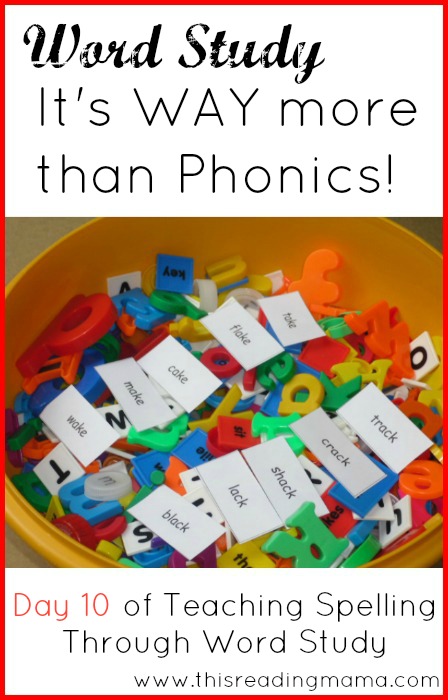*This post contains affiliate links. To read more about this, please see my full disclosure policy.
We made it to Day 10 of Teaching Spelling through Word Study and I seriously feel like we’ve only touched the tip of the iceberg! If you’re joining me for the first time today, welcome to This Reading Mama. You can click HERE or on the above picture to see all the topics we’ve explored in this series. You can also click HERE to visit the other bloggers of iHomeschool Network who are posting 10 day series as well.
I’ve focused much of my attention on how word study helps with the teaching of spelling patterns. Today, I want to show you one of my favorite things about word study (I must admit, I have a lot of favorites when it comes to word study) : it’s WAY more than just phonics! Word Study grows with the child’s development and begins to shift its focus to word meanings.
Word study at an intermediate level “emphasizes active exploration of words and the application of word knowledge to spelling, vocabulary development, and the analysis of unknown words encountered in reading.” –Words Their Way, 250
Sorts for Vocabulary Development
Before I get a little deeper into the nitty-gritty of word meaning study, let’s look at a simple example that demonstrates word study on a vocabulary level. Let’s say you’re doing a unit on animals and you want to assess what students know about certain animal groups. You could break out a vocabulary sort like the one you see below. 
Vocabulary sorts can be adapted and created for all the content areas. They can be used to assess prior knowledge or to spawn research and exploration of a certain topic. And this type of vocabulary sort doesn’t necessarily need to be saved just for students in this spelling stage of development.
Students in this stage “learn how to read word origins through the study of word prefixes, roots, and suffixes from Greek, Latin, and other languages.” –A More Effective Way to Teaching Spelling, Mattman/Cowan
Suggested Order of Teaching for Word Meaning (adapted from WTW)
- Spelling-Meaning Connections– words that are related in meaning are often related in spelling: crime-criminal, attract-attraction, or money-monetize
- Prefixes– starting with common ones like: pre-, un– or ex–
- Suffixes– starting with common ones like: –ly, -er, or –less
- Greek & Latin Root Words– again, starting with common ones like: spect, dic, or auto
Reinforcing the connection between spelling and meaning is important because ultimately, it supports vocabulary growth and comprehension.
Reading to Learn
As students move into the upper elementary grades, much of their reading becomes content area reading. In other words, they begin to transition from learning to read INTO reading to learn. When students are taught how to break apart the meaning components of words (morphemes) like in the words transmit, homophone, and geologist, they are better equipped to comprehend the texts they are reading.
It’s Greek to Me!
If you’ve watched a spelling bee, you’ve probably noticed that students will frequently ask what the origin of the word is. Why? Because the origin of a word can dictate the spelling in quite a predictable way.
“Since the Renaissance, scholars have drawn from the Greek language to name scientific concepts and discoveries. As a result, middle school (and older) students will encounter hundreds of words derived from Greek in math, science, and philosophy texts” –How Spelling Supports Reading.
It only makes sense to support our young readers and spellers by studying these word chunks, for their spellings AND their meanings.
Further Resources for Word Meaning Development:
-
A dictionary- “At the higher levels [of word study] the use of the dictionary is fully integrated as students investigate meanings and connections between words.” –Mattmann/Cowan
To wrap up our series on word study, I’ll leave you with this quote from Moats,
“Even if spell checkers were improved dramatically, such that they caught virtually all spelling errors, …the type of in-depth word study described here would still be extremely valuable to students. The benefits go well beyond good spelling: For young children, research clearly indicates that spelling supports learning to read, and for older children, it’s likely that learning about the meaningful relationships between words will contribute to vocabulary growth and reading comprehension.”
To read all the posts in my 10 Days of Teaching Spelling through Word Study, click HERE!
Enjoy teaching!
~Becky

This was a great 10 days of word study! You are amazing.
I wanted to share this note with you:
https://www.facebook.com/notes/spelling-scholar/a-short-history-of-spelling/297699007006413
This is an interesting note that sheds light on why we have the vocabulary that we do.
Love it! And thank you for your encouragement! 🙂 Thanks for all your help during this series.
Thank yo very much for sharing your knowledge of this topic. I found it really easy to follow and I’m sure my students will benefit.